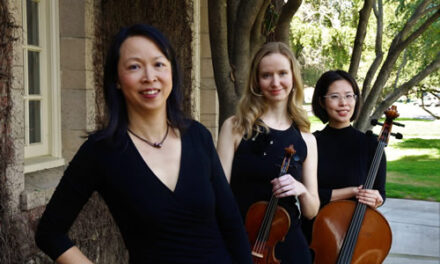Dobro player Billy Cardine and pianist Michael Jefry Stevens, paired with a dimly lit room, created a very relaxing environment during their concert performed at the Black Mountain Center for the Arts. The Western North Carolina Jazz Society sponsored the performance. Playing a mix of the blues and smooth jazz, musical conversations echoed across the room and left the audience in good spirits.
The concert was very laid back and almost cabaret style. The pieces that were performed came from various points of Stevens’ life, inspired by events like his search for an apartment in New York. From the way the two conversed between numbers, it seemed as if they had performed together before, though not very frequently. The camaraderie between the duo was, however, beautiful.
Cardine’s instrument, the dobro, is similar to the guitar and looks a lot like one. However, instead of resting the back of the instrument parallel to the performer’s body, the instrument rests perpendicular to the performer. It often rests on the stomach. The strings are plucked and a glass or metal slide is used across the frets instead of the fingers. Dobro timbres are often pure, due to the slide used on the frets. This instrument is famous for the use of glissandos and vibrato on the strings. It is most frequently used in bluegrass and folk music, though it often appears in jazz duos or combos.
The performance was an interesting one, with some of the pieces sounding more like soundscapes than cohesive improvisational pieces. Pianist Stevens, who said that many of the works were inspired by life events, composed all the pieces. As with the example mentioned above, one of the numbers they played that sounded a lot like a soundscape featured the hum and franticness of busy New York streets. It was extremely fascinating to hear music with no definite melody or rigid chord structures. Cluster tones and polyrhythms added a certain sense of drive to the music, but as far as a distinguishable melody goes, there was just sound. Hearing soundscapes so well done by Cardine and Stevens was an ethereal and enjoyable experience for everyone in the audience.
To counter the abstract design of the soundscape music, more traditional jazz numbers were performed. These pieces featured an opening theme followed by a musical conversation between Cardine and Stevens. One of the numbers in particular, “Sleepytime Blues,” was quite the opposite of slumber-inducing music. With an allegro tempo and smooth, grooving lines played by both Cardine and Stevens, the work was definitely a toe-tapper.
What was remarkably impressive was that Billy Cardine told the audience he had forgotten his capo, so Stevens actually transposed his entire piece, “Polymorphus,” down a whole step. This was a remarkable feat on the pianist’s part, and the technical demands of the jazz number were pulled off effortlessly.
Billy Cardine and Michael Jefry Stevens delivered a beautifully relaxed concert and left a wonderful impression on the small, yet attentive audience.
For more information on the WNCJS and its offerings, click here.











